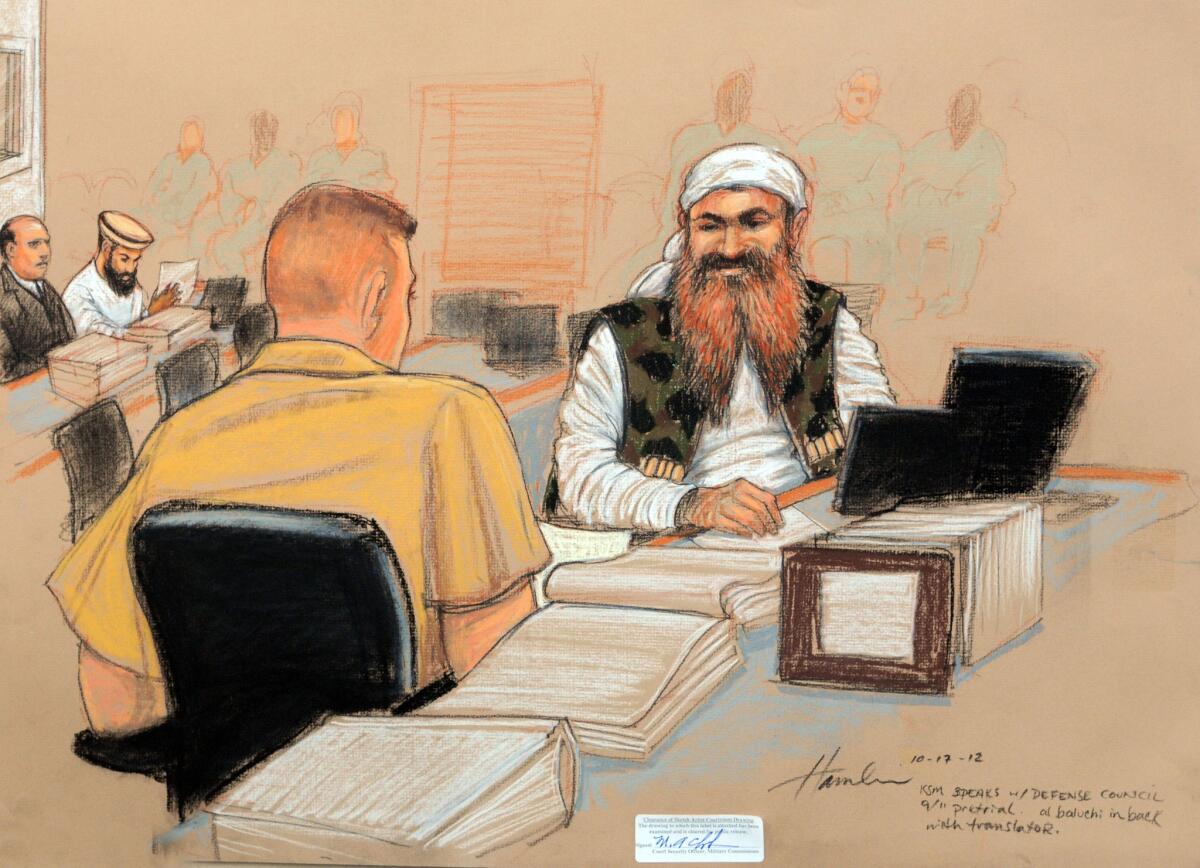U.S. seeks more secrecy in 9/11 case

- Share via
FT. MEADE, Md. — Government prosecutors in the Sept. 11 conspiracy case broadened their request for secrecy Thursday by asking for more restrictions against the public release of sensitive law enforcement material collected in the sweeping investigation into the 2001 terrorist attacks.
Edward Ryan, a Justice Department prosecutor, said the government was prepared to turn over more than 200,000 separate documents to defense lawyers as part of the legal discovery process, but asked the military commission judge to bar the public release of much of that material to protect secret law enforcement investigative techniques and information about clandestine terrorist activities.
Khalid Shaikh Mohammed, charged with masterminding the Sept. 11 attacks, is on trial with four other suspected Al Qaeda operatives.
“This is an extraordinary matter,” Ryan said, describing the period of more than an hour between the first plane striking the World Trade Center in New York and the fourth plane slamming into a field in Pennsylvania.
“In 102 minutes, thousands of police officers and FBI agents began working on one case. Almost every agent in the country was involved in some way. This generated a huge investigation, probably the largest in the nation. It produced an enormous amount of material,” Ryan said.
That material, he said, includes “911 calls from individuals trapped inside the burning towers to people who may have rented rooms or mail boxes to Mohamed Atta or one of the other hijackers.” Atta, one of the engineers of the hijackings, piloted one of the passenger jets into the World Trade Center.
Other materials, Ryan said, deal with “military operations that are sensitive” and the “names of suspected terrorists and the strategies they used to communicate with one another, their operational nicknames and code words.”
Ryan, speaking at a hearing held at the U.S. naval base at Guantanamo Bay, Cuba, added that similar restrictions were imposed in the federal court trials of Zacarias Moussaoui, the so-called 20th hijacker who was sentenced to life in prison, and Oklahoma City federal building bomber Timothy J. McVeigh, who was executed.
Ryan said that once the materials are handed over to the defense in the discovery phase of the case, the government does not want many of them made public in court filings or testimony, or released to the public in other ways.
“Discovery,” he said, “is not a public process. It’s not a source of open public access.”
Defense attorneys asked for some modifications, especially the government’s request that the five defendants not be allowed to see any of the sensitive or classified material.
“This is a capital case,” said David Nevin, attorney for the lead defendant, Mohammed. “His life is literally at stake. And it’s not fair for any part of the case to be kept secret from him. Mr. Mohammed should be permitted to see everything.”
Cheryl Bormann, attorney for Walid bin Attash, an alleged Al Qaeda training camp steward, agreed. “My client has the right to see the information the government is going to use to seek his death,” she said.
Judge James L. Pohl, an Army colonel, said he would rule later in the matter.
On Wednesday, prosecutors urged the judge to issue a protective order against the use of different classified national security material in the case, but lawyers for the defendants said the order would hamstring them in mounting a vigorous defense. The judge took that matter under advisement as well.
Also charged with conspiracy and terrorism are Ramzi Binalshibh, the alleged plot cell manager, and suspected Al Qaeda financiers Mustafa Ahmed Hawsawi and Ammar al Baluchi, aka Ali Abdul Aziz Ali.
Binalshibh and Hawsawi chose not to attend the pretrial hearing. The proceedings are being telecast via a secure video link to Ft. Meade.
More to Read
Sign up for Essential California
The most important California stories and recommendations in your inbox every morning.
You may occasionally receive promotional content from the Los Angeles Times.











